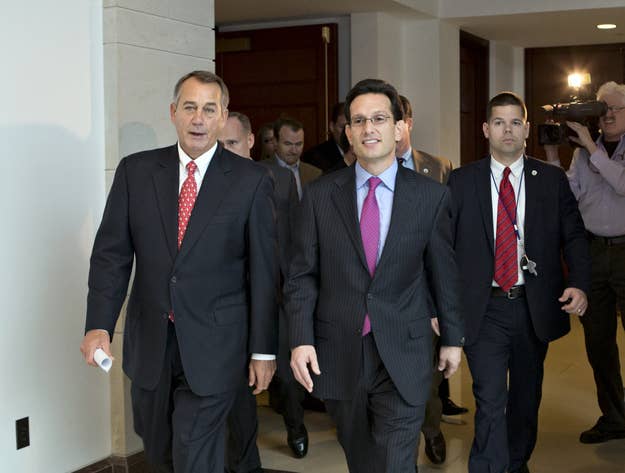
WASHINGTON — House Republican leaders Wednesday reiterated their demands that the Senate take up fiscal cliff legislation as they remain no closer to finding the votes within their conference to pass a bill of their own.
After a 2 p.m. conference call with his leadership team, Speaker John Boehner’s office released a joint statement with other Republican leaders in which House Republicans once again sought to lay the blame for a lack of action on the Democratic-controlled Senate.
"The House has acted on two bills which collectively would avert the entire fiscal cliff if enacted," the statement read. "Those bills await action by the Senate. If the Senate will not approve and send them to the president to be signed into law in their current form, they must be amended and returned to the House."
"Once this has occurred, the House will then consider whether to accept the bills as amended, or to send them back to the Senate with additional amendments," the statement continued. "The House will take this action on whatever the Senate can pass, but the Senate first must act."
Whether the Senate can act remains an open question. Boehner and Obama have always operated under the assumption that the Senate will be an easier pull for some sort of fiscal cliff deal than the House.
And, a Senate Democratic leadership aide said Wednesday, Senate Democrats "are still waiting for Republicans to agree to either support or not block any bill whatsoever."
"That's the basic threshold that needs to be met for us to move forward," the aide said.
But with the House in disarray at this point, conservatives said they are now focusing on the upper chamber, where they believe they can once again stymie efforts to pass a bill.
One conservative activist familiar with the state of play warned that even a short-term measure will likely include things like unemployment insurance, which many conservatives oppose.
“It’s not just the tax stuff. They’re going to be voting on unemployment insurance as well. That’s a hard path too because they’re going to need people to flip,” the activist said.
And even if Majority Leader Harry Reid is able to find 60 votes, at this point unless a deal is announced in the next few days, conservatives could slow-walk the measure long enough to push past the first of the year and potentially even into the next Congress.
Should the Senate pass a bill, Boehner will still face a major lift in the House, where rank-and-file conservatives remain unhappy. House Republican leadership "haven’t really involved rank-and-file in the negotiations, which has been part of the frustration" among conservatives, one GOP aide said, noting that leadership has yet to plan even a conference call with rank and file to discuss the situation.

